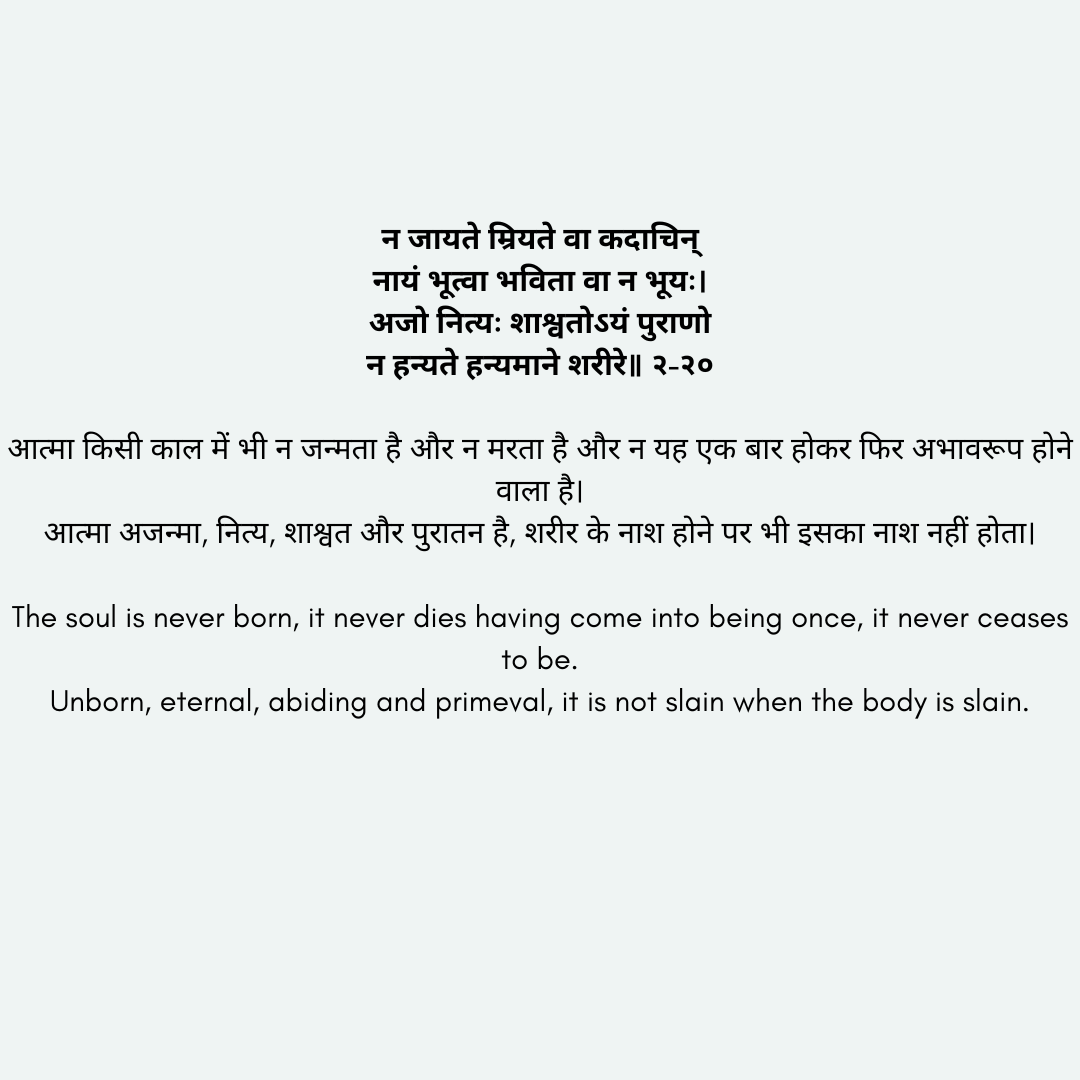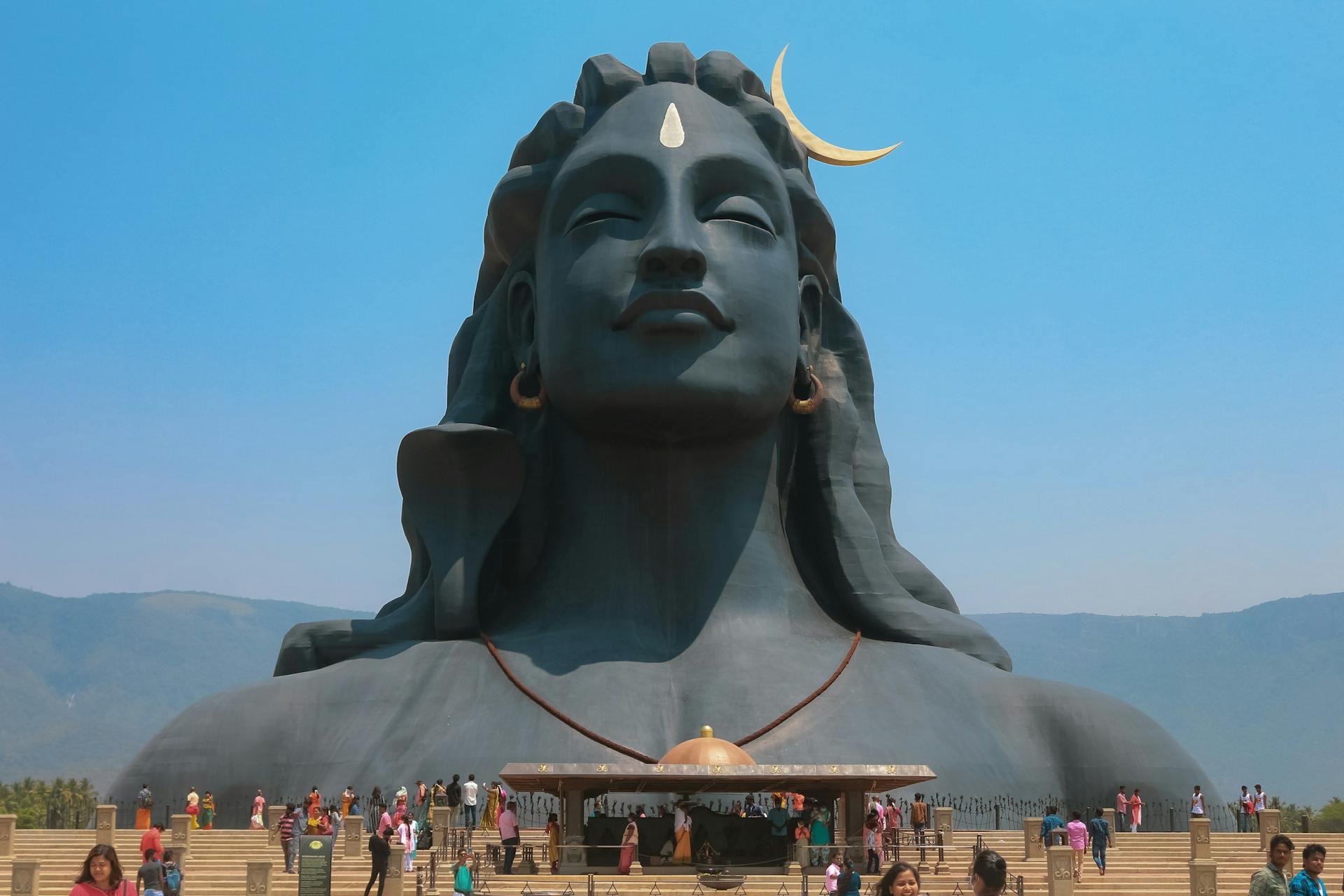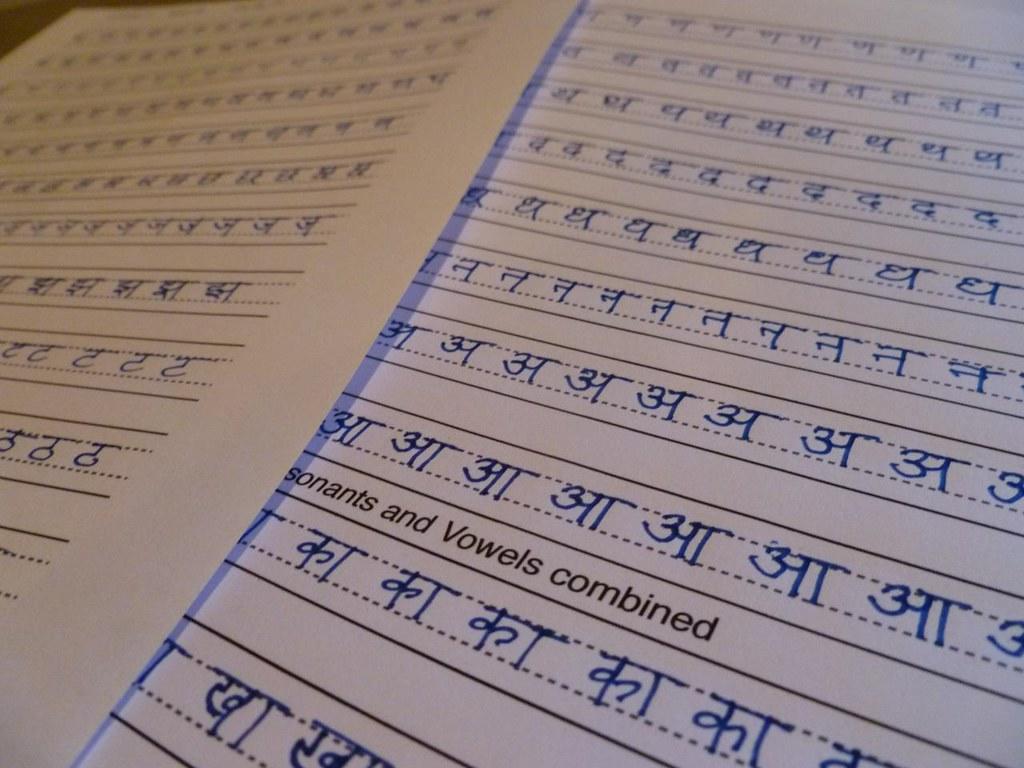The Bhagavad Gita offers timeless guidance on duty, strength, and inner peace. Some of its most meaningful lines express profound wisdom in just a few words:
- “Karmanye vadhikaraste ma phaleshu kadachana.” — Bhagavad Gita 2.47
(You have the right to perform your duty, but not to the fruits of your actions.) - “Yogastha kuru karmani.” — Bhagavad Gita 2.48
(Act with discipline and calmness of mind.) - “Man mana bhava mad-bhakto.” — Bhagavad Gita 9.34
(Fix your mind on Me and be devoted to Me.)
The Bhagavad Gita, often known as the "Song of the Spirit," is a text that should be continuously sung and represents the divine union of truth-realization between man and his Creator. The Gita's 700 short verses contain vast wisdom that unites the fundamental principles of all great global scriptures.
Sage Vyasa skillfully crafted the Bhagavad Gita in a language of simile, metaphor, and allegory by fusing historical details with psychological and spiritual truths, creating a word picture of the turbulent inner battles that must be fought by both the material and the spiritual human. To prevent them from being destroyed by the ignorance of the kali yuga, toward which civilization was sliding at the same time as Sri Krishna's last incarnation on earth, he veiled the deepest spiritual truths under the hard shell of symbolism.
What is Bhagavad Gita (भगवद् गीता।)?
The Bhagavad Gita, often called the Gita, is a 700-verse Hindu scripture that is a part of the epic Mahabharata. It consists of a conversation between Prince Arjuna and Lord Krishna, who serves as his charioteer
The Bhagavad Gita, a thorough metaphysical and psychological treatise, describes all the experiences that the spiritual pilgrim on the path of emancipation will have, including both the favorable conditions the devotee is working toward and the unfavorable conditions that attempt to discourage the devotee and divert him from his objective. A devotee who is aware of the path he must take would never be uncertain or disheartened by inescapable opposition.
“Now I am become Death, the destroyer of worlds,” is not a direct quote from the Bhagavad Gita but his paraphrase of Chapter 11, Verse 32, spoken by Krishna during the revelation of his divine form.
Original Gita verse (11.32):
कालोऽस्मि लोकक्षयकृत् प्रवृद्धो…
“I am Time, the great destroyer of worlds, and I have come to annihilate all beings. Except for you, all the soldiers assembled here will perish.”

Bhagavad Gita Quotes In English & Hindi
The Bhagavad Gita is our life's manual, according to many experts. Our questions regarding life and its activities can have many different answers. Here are a few shlokas from the Gita for children out of the total of 700 verses and 18 chapters.
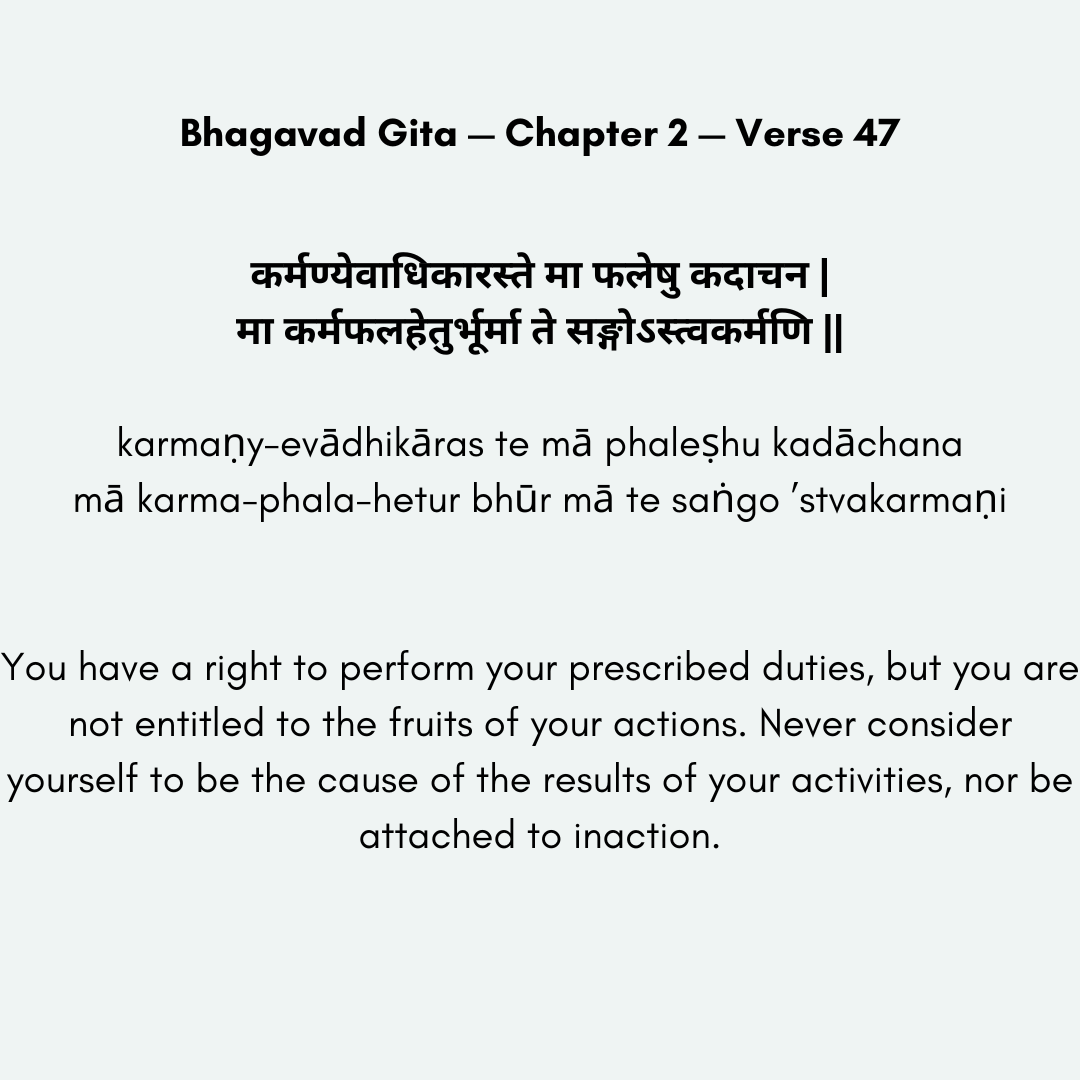
Bhagavad Gita — Chapter 2 — Verse 20
न जायते म्रियते वा कदाचि
नायं भूत्वा भविता वा न भूय: |
अजो नित्य: शाश्वतोऽयं पुराणो
न हन्यते हन्यमाने शरीरे ||
na jāyate mriyate vā kadāchin
nāyaṁ bhūtvā bhavitā vā na bhūyaḥ
ajo nityaḥ śhāśhvato ’yaṁ purāṇo
na hanyate hanyamāne śharīre
The soul is neither born, nor does it ever die; nor having once existed, does it ever cease to be. The soul is without birth, eternal, immortal, and ageless. It is not destroyed when the body is destroyed.
Bhagavad Gita — Chapter 16 — Verse 21
त्रिविधं नरकस्येदं द्वारं नाशनमात्मन: |
काम: क्रोधस्तथा लोभस्तस्मादेतत्त्रयं त्यजेत् ||
tri-vidhaṁ narakasyedaṁ dvāraṁ nāśhanam ātmanaḥ
kāmaḥ krodhas tathā lobhas tasmād etat trayaṁ tyajet
There are three gates leading to the hell of self-destruction for the soul — lust, anger, and greed. Therefore, all should abandon these three. These traits are the main source of all the problems of life.
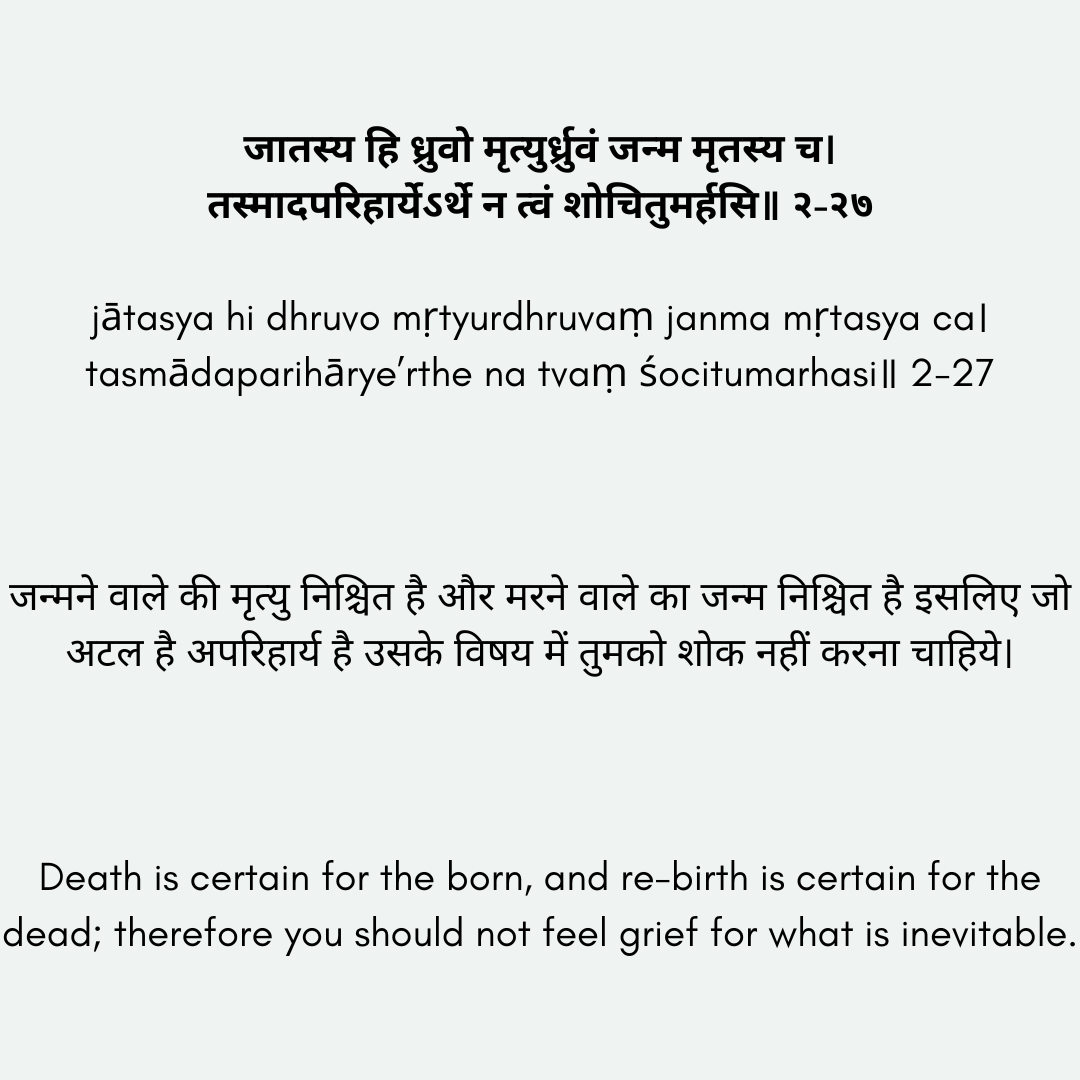
Bhagavad Gita — Chapter 2 — Verse 14
मात्रास्पर्शास्तु कौन्तेय शीतोष्णसुखदु: खदा: |
आगमापायिनोऽनित्यास्तांस्तितिक्षस्व भारत ||
mātrā-sparśhās tu kaunteya śhītoṣhṇa-sukha-duḥkha-dāḥ
āgamāpāyino ’nityās tans-titikṣhasva bhārata
O son of Kunti, the contact between the senses and the sense objects gives rise to fleeting perceptions of happiness and distress. These are non-permanent and come and go like the winter and summer seasons. O descendant of Bharat, one must learn to tolerate them without being disturbed.
Discover how to read, write, and speak with Hindi classes near me on Superprof.
Bhagavad Gita — Chapter 2, Verse 63
क्रोधाद्भवति सम्मोह: सम्मोहात्स्मृतिविभ्रम: |
स्मृतिभ्रंशाद् बुद्धिनाशो बुद्धिनाशात्प्रणश्यति ||
krodhād bhavati sammohaḥ sammohāt smṛiti-vibhramaḥ
smṛiti-bhranśhād buddhi-nāśho buddhi-nāśhāt praṇaśhyati
Anger leads to clouding of judgment, which results in bewilderment of the memory. When the memory is bewildered, the intellect gets destroyed; and when the intellect is destroyed, one is ruined.
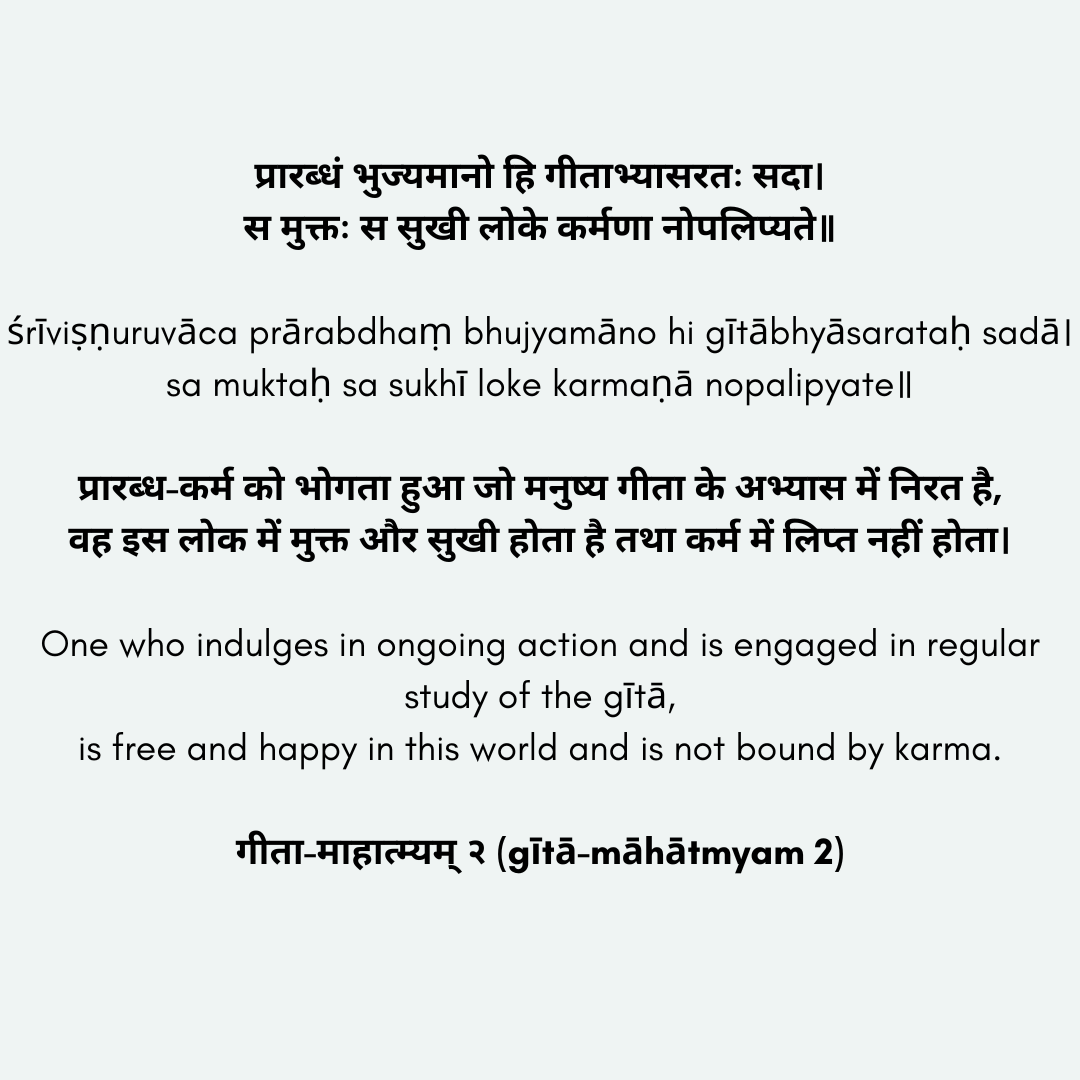
Life Lessons from the Bhagavad Gita
The ageless ideas of the Bhagavad Gita can help us get a comprehensive grasp of the hows and whys of existence. Incorporating the Bhagavad Gita's teachings into our daily lives will also encourage the practice of self-reflection and guide us toward a more realistic perspective on life.
Learn to be tolerant and forgiving
कर्मण्येवाधिकारस्ते मा फलेषु कदाचन । मा कर्मफलहेतुर्भुर्मा ते संगोऽस्त्वकर्मणि ॥
When Arjun was hesitant to fight the war with his cousins the Kauravas, Krishna said this.
Do your duty, and here your duty is to fight the Adharma of the Kauravas, Don't care about the fruits or the result or the outcome, because you don't have any control or right over it. You have right only on your actions and your duty.
Tolerance teaches us to resist using force, even when provoked, and to maintain our composure in the face of life's difficulties. With the help of forgiveness, we can put wrongdoing behind us and get rid of animosity. These two qualities are crucial for developing connections, increasing empathy and affection, and dispelling unpopular beliefs. These two tenets formed the basis of the Pandava brothers' relationship.
There is Bhagavad Gita Quote, a lot of people can use for motivation, it says:
“You are what you believe in. You become that which you believe you can become”
Use this quote as a reminder that having belief in something can help you grow as a person, and believe in your ability to achieve what you dream.
Never undervalue the impact of faith
He who is full of faith and zeal and has subdued his senses obtains Knowledge; having obtained Knowledge, he soon attains the Supreme Peace. (4.39)
Faith, trust, and belief are a person's three most powerful inner forces. It is possible for a young mind that is strong in faith and conviction to overcome exterior danger or terror. If you have any doubts about your capacity to achieve whatever task you set out to do, now is the time to think about it. According to the Gita, having unwavering trust is the gem of the heart.
Maintaining faith might be difficult at times. You must, however, retain your composure under these circumstances to pull off the seemingly impossible. Never forget that the only way to fully evolve is to go through the entire gamut of emotions without sacrificing your beliefs.
Evolution is Natural
Everything is fleeting. Things and circumstances change. As cliche as it may sound, change is the only thing that never changes. But impressionable, young minds are averse to change. It is critical to understand that neither change nor advancement is possible without the other. Even if things move slowly, have patience. A little progress each day produces amazing results.
You are only entitled to the action, never to its fruits. (Karm Karo Fal Ki Chinta Mat Karo)
Bhagvad Gita
The best illustration of how nothing in this world is ever permanent is how day changes into night and then back into day again. Those who have attempted but failed should be motivated by this example to continue their efforts. People who are going through challenging situations shouldn't give up until they can change the course of events.
Lord Krishna Quotes In English (Bhagavad Gita Quotes in English)
The character of Krishna in the Mahabharata held in high regard the virtues of loyalty, calmness, and friendship. To him, the mind and thoughts were of utmost significance. Here are some quotes of Lord Krishna for your daily inspiration.
सर्वत: पाणिपादंतत्सर्वतोऽक्षिशिरोमुखम् |
सर्वत: श्रुतिमल्लोकेसर्वमावृत्यतिष्ठति||
sarvataḥ pāṇi-pādaṁ tat sarvato ’kṣhi-śhiro-mukham
sarvataḥ śhrutimal loke sarvam āvṛitya tiṣhṭhati
Everywhere are His hands and feet, eyes, heads, and faces. His ears too are in all places, for He pervades everything in the universe.
कर्मण्येवाधिकारस्तेमाफलेषुकदाचन |
माकर्मफलहेतुर्भूर्मातेसङ्गोऽस्त्वकर्मणि ||
karmaṇy-evādhikāras te mā phaleṣhu kadāchana
mā karma-phala-hetur bhūr mā te saṅgo ’stvakarmaṇi
You have a right to perform your prescribed duties, but you are not entitled to the fruits of your actions. Never consider yourself to be the cause of the results of your activities, nor be attached to inaction.
परित्राणायसाधूनांविनाशायचदुष्कृताम्|
धर्मसंस्थापनार्थायसम्भवामियुगेयुगे||
paritrāṇāya sādhūnāṁ vināśhāya cha duṣhkṛitām
dharma-sansthāpanārthāya sambhavāmi yuge yuge
For the protection of the good, for the destruction of the evil, and for the establishment of dharma (righteousness), I (the Lord) am born from age to age.
क्रोधाद्भवतिसम्मोहःसम्मोहात्स्मृतिविभ्रमः।
स्मृतिभ्रंशाद्बुद्धिनाशोबुद्धिनाशात्प्रणश्यति॥
krodhādbhavati sammohaḥ sammohātsmṛtivibhramaḥ।
smṛtibhraṃśād buddhināśo buddhināśātpraṇaśyati॥
From anger, there comes delusion; from delusion, the loss of memory; from the loss of memory, the destruction of discrimination; and with the destruction of discrimination, he is lost. Anger impairs judgment, just as the morning mist creates a hazy covering of the sunlight. In anger, people commit mistakes that they later regret, because the intellect gets clouded by the haze of emotions. The path of descent from divinity to impiety has been described as beginning with contemplation on the sense of objects to the destruction of the intellect.
Inspirational Quotes from the Mahabharata
The Mahabharata is not merely a story of conflict and carnage. This complex and multi-layered literature touches on a number of topics, including dharma (duty and moral responsibility), karma (cause and effect), and the very nature of reality. Here are some famous quotes from the Mahabharata that make it a timeless classic.
“Men experience happiness and misery by turn. No man ever enjoys unmixed happiness. A wise man, possessing high wisdom, knowing that life has its ups and downs, is neither filled with joy nor with grief. When happiness comes, one should enjoy it, and when misery comes one should bear it.”
“What is weightier (more sustaining) than the earth? – Mother, What is higher than the sky? – Father (bestower of more benefits)What is swifter than the wind? – Mind What is more numerous than grass?-Thoughts (of a sorrow-stricken mind) are more numerous than grass.”
“You have the right to perform your actions, but you are not entitled to the fruits of the actions. Do not let the fruit be the purpose of your actions, and therefore you won’t be attached to not doing your duty.”
"Never work hard to seek rewards, work harder to seek fulfillment. If you work hard, you will find the success you are looking for eventually!"
“You see the faults of others, even though they are as small as a mustard seed. But you do not see your own, even though they can be seen as large as a Bilva fruit. … O Duhshanta! My birth is nobler than your own. O lord of kings! You are established on earth. But I roam the sky. Know that the difference between you and me is that between a mustard seed and Mount Meru.”
A man blinded by hate will only see fault in others!
“Anger is in this world, the root of the destruction of mankind, The angry man sins; the angry man murders his preceptor; the angry man insults his ciders with harsh words. The angry man cannot distinguish what should be and should not be said by him. there is nothing that cannot be said or done by an angry man.”
“A man should avoid these six like a leaking boat in the ocean: a teacher who does not teach, a priest who has not studied, a king who fails to protect, a wife who is abusive, a cowherd who wants a village, and a barber who wants a forest.”
“The one who never looks arrogant, never speaks about others with disregard, never says rude words, even if this one has lost self-control – such a person is always liked by everyone.”
“A confused man is a miserly one who does not solve the problems of life as a human and who thus quits this world like the cats and dogs without understanding without the science of self-realization.”
“A wound inflicted by arrows heals, a woodcut down by an axe grows, but harsh words are hateful? a wound inflicted by them does not heal. Arrows of different sorts can be extracted from the body, but a word dart cannot be drawn out, for it is seated in the heart.”
“Truth was found heavier than a hundred horse sacrifices. O king, Truth, I ween, may be equal to the study of, the entire Vedas and ablutions in all holy places. There is no virtue equal to Truth: there is nothing superior to Truth. O king, Truth is God himself; Truth is the highest vow.”
Discover spoken Hindi classes online here on Superprof!
“Friendship never remains in the world in anyone’s heart without being worn out, Time wears it out, anger destroys it. The poor cannot be the friend of the rich, the unlearned cannot be the friend of the learned, the coward cannot be the friend of the brave.”
Bhagavad Gita is a treasure full of wisdom and lessons for everyone regardless of age, once you understand the true meaning behind the chapters.
Tell us in the comments below if you want us to include new quotes from the Bhagavad Gita for you!
Summarise with AI:

